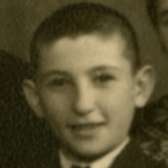
-
Learn More about Nat
- Collections View Nat's family photographs
- First Person Watch Nat share his Holocaust experiences at a First Person program
Nathan Spitzer (now Nat Shaffir) was born on December 26, 1936, in Iasi, Romania, to Anton and Fany Spitzer. In 1931, Anton and his new bride had moved from Transylvania to Bucium, a village near Iasi, along with Anton’s two brothers. The family owned a large dairy farm that supplied dairy products to the Romanian army. The Spitzers’ farm prospered, with many head of cattle. Fany managed the household and raised Nat and his two sisters, Sara and Lili.
One day in November 1942, Romanian authorities visited the farm with a priest who identified the family as Jews. The Spitzers’ farm and all the cattle were confiscated. The family had four hours to pack up their belongings and were allowed to take only one horse and one wagon. They moved into the Socola neighborhood of Iasi. Nat and his sisters were no longer allowed to attend public school.
In June 1943, Romanian military authorities took Nat’s father and other able-bodied men from Iasi to perform forced labor laying new railroad tracks. Iasi fell to the Soviet Army in August 1944 but Anton would not be liberated and able to return until the spring of 1945. By that time, most of the Spitzers’ extended family, who had remained in Transylvania when it was occupied by Hungary, had been killed. Fany’s father and ten of her siblings had been transported to the Auschwitz-Birkenau and Buchenwald concentration camps by Hungarian gendarmerie in complicity with the Germans. (Her mother had died years earlier in childbirth.) Her father later died of starvation in a forced labor camp. Only two of Fany’s brothers, Moshe and Lazar Wax, survived to their liberation. Moshe died shortly after while on board a ship heading to a sanatorium in Sweden; Lazar later immigrated to the United States.
After the Communists seized power, the Spitzer children were ridiculed by their non-Jewish classmates and excluded from Communist student groups. It became evident to Anton that continued antisemitism and discrimination provided an unsafe future for his family under Soviet control. In 1947, Anton and Fany decided to leave Romania for Palestine, but their application for an exit permit was repeatedly denied. Eventually Anton bribed local officials to secure passage to Israel. The Spitzer family left Romania in March 1950 on board a cargo ship called the Transylvania and arrived in the port of Haifa just before Passover.
While in Israel, Nat served for three years in the Israeli army. In 1961, he moved to the United States and in 1969 started his own business. He married Merryl Rich of Atlanta, Georgia, in 1970. They have five children and 12 grandchildren and live in Maryland, and Nat is a volunteer with the United States Holocaust Memorial Museum.
